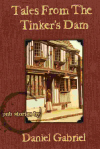Tales from the Tinker’s Dam
Daniel Gabriel’s Tales from the Tinker’s Dam centers around The Tinker’s Dam – a pub in the Vale of Glamorgan in Wales. Reminiscent of James Herriot’s All Creatures Great and Small or Garrison Keillor’s Lake Woebegone Days, these are tales in the best sense of the word, being both humorous and human.
Daniel Gabriel’s Tales from the Tinker’s Dam centers around The Tinker’s Dam – a pub in the Vale of Glamorgan in Wales. Reminiscent of James Herriot’s All Creatures Great and Small or Garrison Keillor’s Lake Woebegone Days, these are tales in the best sense of the word, being both humorous and human.
In the collection’s first story, fittingly titled “First Draught,” Gerry Culhane leaves his homeland of Ireland to become the new publican of The Dam. When he pulls into the “car park” of the country pub, he finds nobody around except an old farmer who says, “Shut up, it is. Been so for months. Dreadful old place, anyway.” Culhane explains that he’s the new owner. Gabriel writes, “The farmer looked up sharply. – New owner, is it? He spat tobacco juice in a puddle along the verge. – Poor bugger.” The farmer’s words are a prophecy.
As in any good collection of tales, the characters are plentiful, quirky, and loveable. Along with Culhane, there’s buxom Margo the barmaid, Evan Evans, Fat Howell, Ginger George, Wee Hughie, and Dai Legg, a woman’s undergarment salesman and rugby expert.
Although there’s humor in the stories, Gabriel never sets his characters up for us to ridicule. Our laughter is sympathetic when one of Culhane’s schemes to increase business fails. Our chuckling is chuckling at our own frailties when Rhys Jones is convinced that Margo is finally falling for him.
And, sometimes, we’re not laughing at all.
In “The Unwarranted Tribulations of Dai Legg,” Legg innocently predicts that Scotland’s team will beat Wale’s team in an upcoming rugby match. It’s not something as a Welshman that he wants, just something that his knowledge of the sport tells him will happen. Regardless, the patrons in the pub turn on him and goad him into betting against Wales. Soon, he’s in for a pile of money and, as he predicted, Scotland wins. For Dai Legg, it is a bitter victory:
Gerry reached up onto the shelf behind the bottles of Dutch gin and tossed a packet of well-creased bank notes onto the counter in front of Dai Legg’s glass. The edge of the packet slid into a pool of spilled beer and there it sat, soaking up the stale bitter while poor Dai tried to wish it away.
The reader, like Legg, can feel how the place will change for him. His friends will always remember this win sullenly, despite the fact that Dai Legg never wanted it or their money. It’s a melancholy moment that Gabriel writes very well.
Still, melancholy isn’t the order of the day in The Dam. More often than not, I found myself laughing, especially at the words that seem to roll so naturally from the characters’ lips. One character, describing another’s thickness or stupidity says, “Too thick to pour piss out of a boot if the instructions was printed on the heel.” In another story, Culhane tries putting out unusual hors d’oeuvres to attract a gentrified dinner crowd. What it attracts is the disdain of his regulars: “Stuffed olives, did he say, said Wee Hughie. – Never et one, and then a moment later – Bloody hell. I can see why.” At the end of the night, cleaning up after the fiasco, Culhane finds that “the ashtrays were full of green olives with one bite gone out of each.”
If I have one complaint about these tales, it’s only that there are so few of them. Because the tales move chronologically and are so interconnected, the book ends up feeling like a novel. And, as such, it’s too thin, leaving me feeling that things ended too quickly. As a consolation, Gabriel also includes an appendix – an excellently-written piece of non-fiction that explores the significance of pubs in British life. It was this piece – coupled with the homey feelings that I carried over from the tales – that left me wanting to open a pub myself here in America. Not a bar, a pub. Like Culhane, I found myself thinking that I just might be able to make a go of it.
Such is human folly and faith, and Daniel Gabriel writes of both very well in Tales from the Tinker’s Dam.





